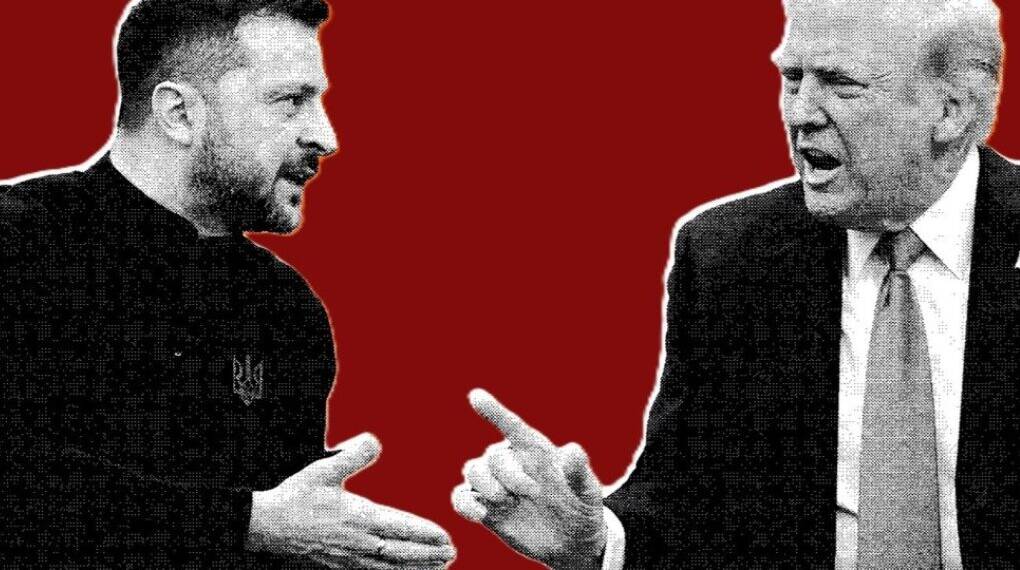The evolving diplomatic relationship between Volodymyr Zelenskyy and Donald Trump since Trump’s return to the U.S. presidency in 2025 has been complex, marked by tension and significant behind-the-scenes maneuvering.
Zelenskyy’s ability to rebuild rapport with Trump, a critical potential supporter amid the ongoing Russia-Ukraine war, was heavily aided by Ukraine’s key allies in Europe and beyond, who played a strategic role in shaping the dialogue between the two leaders.
The Contentious 2025 Oval Office Meeting
Zelenskyy’s February 28, 2025, Oval Office meeting with Trump and Vice President JD Vance was highly anticipated as an opportunity to strengthen U.S. support for Ukraine. However, it quickly devolved into a public confrontation.
Trump and Vance accused Zelenskyy of being ungrateful, resisting peace efforts, and prolonging the war. Trump insisted on an immediate ceasefire with Russia, while Zelenskyy insisted on strong security guarantees before any truce. The encounter ended abruptly, damaging Zelenskyy’s standing with the Trump administration.
The fallout was immediate. The Trump administration briefly suspended intelligence and military aid to Ukraine, signaling cooling U.S. support. Trump vocalized skepticism about Ukraine’s readiness for peace and criticized Zelenskyy both publicly and on social media, describing him as “not ready for Peace if America is involved” and even calling him a “dictator” due to the postponement of elections during martial law.
Also Read: Trump Asked Zelenskyy if Ukraine Could Strike Moscow and St. Petersburg with U.S. Weapons
Allies Step In to Mend Bridges
Despite the frosty tone from the Trump administration, a swift and coordinated response from Zelenskyy’s allies helped recalibrate the U.S.-Ukraine relationship. European leaders — notably, French President Emmanuel Macron — persuaded the Trump administration to proceed with Zelenskyy’s Washington visit despite internal reluctance.
The United Kingdom’s early 2025 long-term mineral partnership with Ukraine and diplomatic encouragement reinforced Ukraine’s strategic value and bargaining power, particularly as Zelenskyy sought to secure an agreement on mineral resources with the U.S.—a key issue for the Trump administration.
Moreover, bipartisan U.S. political figures supportive of Ukraine’s defense and European stability helped craft a more favorable environment for dialogue. Senators such as Lindsey Graham advised Zelenskyy to focus on securing mineral agreements first, deferring more contentious issues like ceasefire talks for later negotiations.
This pragmatic advice helped Zelenskyy navigate Trump’s transactional approach to diplomacy, where resource leverage often preceded security commitments.
Diplomacy Beyond Direct Talks
Ukraine’s allies also worked to shore up Zelenskyy’s position by amplifying his message in Western media and leveraging international forums to criticize Russia’s aggression and affirm Ukraine’s needs. This external support counterbalanced unfavorable narratives coming from the Trump administration, which occasionally aligned with Russia at the UN and reduced direct military assistance.
At the NATO summit in June 2025, Trump and Zelenskyy met again on the sidelines, with Trump expressing openness to supplying Ukraine with new Patriot missile systems, signifying partial warming of ties.
This shift was underpinned by sustained behind-the-scenes diplomacy by Western allies pressing the Trump administration to maintain essential aid and weapons shipments.
The Importance of Transactional and Flattering Diplomacy
Understanding Trump’s diplomatic style was crucial for Zelenskyy’s team and supporting allies. Ukraine’s foreign policy advisors adapted strategies to appeal to Trump’s preference for transactional, personality-driven diplomacy, including flattery and focusing on tangible benefits like mineral deals or arms sales.
Allies encouraged Zelenskyy to tailor his communications and negotiations to align with Trump’s pragmatism and appetite for ‘deal-making,’ helping soften prior antagonism.
Looking Ahead: A Delicate Balance
While Zelenskyy regained some standing with Trump, the relationship remains volatile and contingent on visible progress toward peace and resource agreements. Trump has repeatedly urged Ukraine to consider ceasefire talks, even as Zelenskyy continues to insist on guarantees preventing future Russian aggression.
The role of Ukraine’s allies in mediating this fraught relationship will likely remain a defining factor in sustaining U.S. support amid an evolving geopolitical landscape.
Ukraine’s allies, particularly European leaders and bipartisan U.S. politicians were instrumental in helping Zelenskyy repair his fractured relationship with President Trump after the contentious 2025 Oval Office meeting.
By advocating for Ukraine’s strategic interests, facilitating key agreements (such as mineral resource deals), and adapting diplomatic messaging to Trump’s transactional style, these allies enabled Zelenskyy to regain crucial U.S. support necessary for ongoing defense and peace negotiations.
The delicate balance between Ukraine’s security needs and Trump’s political priorities will continue shaping the trajectory of their bilateral ties as the war with Russia endures.








